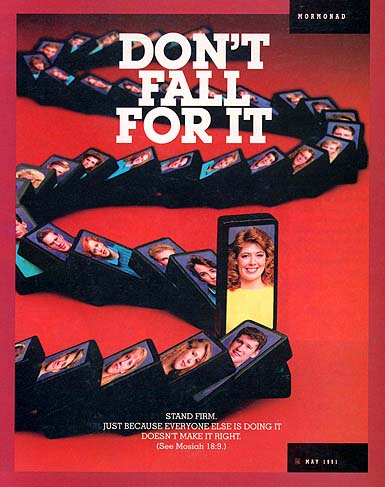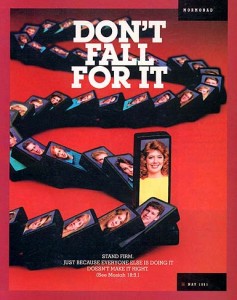When I was growing up, people were always telling me to avoid negative peer pressure. They made it sound so easy. “If someone asks you to do something you shouldn’t, just say no and walk away.” Sometimes inspirational stories told in church classes made it sound pretty easy to. A teenager says she won’t do something because it’s wrong and all her friends apologize and decide to do something different.
Great stories, but of course, that’s not how it worked in real life. When I was a freshman in high school, I found myself unexpectedly getting attention from a group of popular kids. I don’t know how I came to their attention since popular had never been part of my life. Actually, I’d never really had any desire to be popular. I’d always been happy with the friends I had, but somehow, when they started paying attention to me and to my friend, we both were so flattered we forgot popularity had never been very important to us.
At first, everything seemed great. However, my friend David pulled me aside and warned me the kids in that group were dangerous. He said they didn’t have values and they liked to pull good kids into their group and try to corrupt them. I shrugged off his warning, figuring he was jealous of the time I spent with the new friends I had.
Then one day at a party for my drama class, they invited me to go for a walk with them, saying it was too hot inside. I guess I was pretty inexperienced, because I actually thought they were going for a walk. I loved nighttime walks. Instead, of course, they pulled out cigarettes. I had watched my grandmother suffer from emphysema for several years, the result of a lifetime of smoking, so I was not even tempted to smoke. I refused their offer and instead of accepting it, as always happens in stories, they started making fun of me. Even worse, my friend took one, looking a little embarrassed as she did so. I wanted to yank it out of her mouth, knowing what she was doing to herself, but I didn’t. I didn’t really know what to do. I was hurt that my “friends” would make fun of me for doing what I was knew was right and I was angry that they’d gotten my friend to give in so she could fit in, but I also lacked the courage to just go into the house alone. I wouldn’t give in, knowing what I knew, but I stayed with them. Finally one of the girls told the others to leave me alone.
The worst was yet to come, though. When we went back inside, a boy I really admired walked over to me and said, “I know they do all kinds of things they aren’t supposed to, but I thought you were different.” I realized, as he walked away, he thought I had smoked because I was with them. I realized everyone knew why they’d gone outside and by going with them—and by returning with them—I sent a false message that I was just like them.
That weekend, I paid more attention to David’s warning. I learned they did a lot of things I hadn’t known they did. I was shy, though, and not very brave, so I didn’t know what to do. On Monday, not wanting to see them in drama class or at lunch, I came to school early and went to talk to my guidance counselor. She suggested we rearrange my schedule so I had no classes with them and so my lunch would be at a different time. That took away any temptation to continue to bask in the prestige of their popularity and made it easier for me to break off the ties—we just never really saw each other any more.
When I walked into the cafeteria that day, I saw David. He motioned me over and I joined the friends I had abandoned. I was lucky they wanted me back. Popularity didn’t seem so appealing anymore as I found myself thinking about the trouble I could have gotten myself into and the damage I’d done to my reputation just by hanging out with the wrong crowd. I didn’t do anything wrong, but no one else knew that.
That story had a happy ending for me, but it didn’t for my friend, who stayed with the group and adopted their values. She had a hard life ahead once she abandoned her standards and her dreams for life to focus on being accepted and popular. I tried to help, but there was nothing I could do. A person has to take the first step alone before others can step in to help.
As an adult now, I can’t remember why it seemed so important to be in that group. I had nothing in common with those people and they didn’t care about me. If they’d cared about me as a person, they would have respected my standards. I was so much happier with friends who shared my values and who respected me if I chose a higher value once in a while. More importantly, their high standards encouraged me to live a better life. We had fun, but we always had an eye on a bright and glorious future. We knew high school wasn’t all there was to life.


